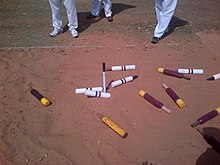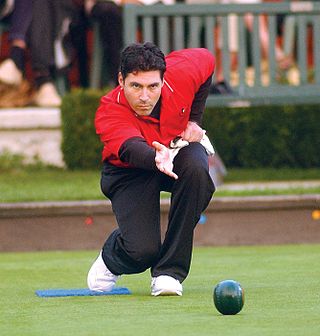
Bowls, also known as lawn bowls or lawn bowling, is a sport in which players try to roll their ball closest to a smaller ball. The bowls are shaped (biased), so that they follow a curved path when being rolled. The game is played either in teams or one against one.
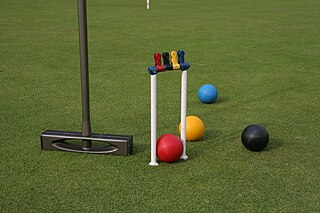
Croquet is a sport which involves hitting wooden, plastic, or composite balls with a mallet through hoops embedded in a grass playing court.

Pétanque is a sport that falls into the category of boules sports. In these sports, players or teams play their boules/balls towards a target ball. In pétanque the objective is to score points by having boules closer to the target than the opponent after all boules have been thrown. This is achieved by throwing or rolling boules closer to the small target ball, officially called a jack, or by hitting the opponents' boules away from the target, while standing inside a circle with both feet on the ground. The game is normally and best played on hard dirt or gravel. It can be played in public areas in parks or in dedicated facilities called boulodromes.

Skittles is a historical lawn game and target sport of European origin, from which the modern sport of nine-pin bowling is descended. In regions of the United Kingdom and Ireland the game remains as a popular indoor pub game.

South African cuisine reflects the diverse range of culinary traditions embodied by the various communities that inhabit the country. Among the indigenous peoples of South Africa, the Khoisan foraged over 300 species of edible food plants, such as the rooibos shrub legume, whose culinary value continues to exert a salient influence on South African cuisine. Subsequent encounters with Bantu pastoralists facilitated the emergence of cultivated crops and domestic cattle, which supplemented traditional Khoisan techniques of meat preservation. In addition, Bantu-speaking communities forged an extensive repertoire of culinary ingredients and dishes, many of which are still consumed today in traditional settlements and urban entrepôts alike.
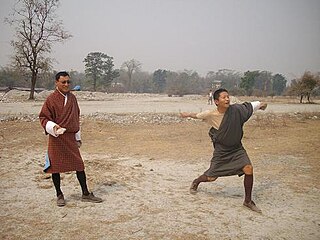
Digor or degor is a traditional sport in Bhutan, somewhat resembling the sport of shot put.

Table shuffleboard is a game in which players push metal-and-plastic weighted pucks down a long and smooth wooden table into a scoring area at the opposite end of the table. Shooting is performed with the hand directly, as opposed to deck shuffleboard's use of cue sticks.
Variations of basketball are games or activities based on, or similar in origin to, the game of basketball, in which the player utilizes common basketball skills. Some are essentially identical to basketball, with only minor rules changes, while others are more distant and arguably not simple variations but distinct games. Other variations include children's games, contests or activities intended to help the player practice or reinforce skills, which may or may not have a competitive aspect. Most of the variations are played in informal settings, without the presence of referees or other officials and sometimes without strict adherence to official game rules.
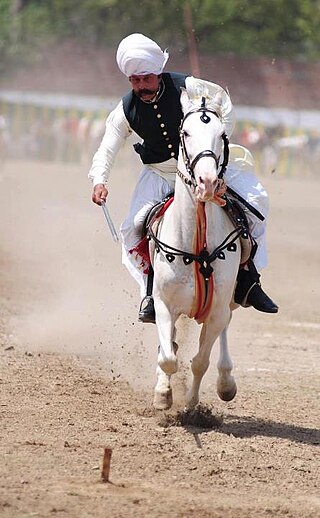
Tent pegging is a cavalry sport of ancient origin, and is one of only ten equestrian disciplines officially recognised by the International Equestrian Federation. Used narrowly, the term refers to a specific mounted game with ground targets. More broadly, it refers to the entire class of mounted cavalry games involving pointed and edged weapons on horseback, for which the term "equestrian skill-at-arms" is also used.
Traditional Filipino games or indigenous games in the Philippines are games that are played across multiple generations, usually using native materials or instruments. In the Philippines, due to limited resources for toys, children usually invent games that do not require anything but players. There are different kinds of Filipino traditional games which are well-suited for kids, and the games also stand as one of the different cultural and traditional games of the Philippines. Due to the variety of skills used in these games, they serve an important purpose in the physical and mental development of Filipino children. These games are also an important part of Filipino culture.
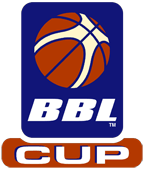
The British Basketball League Cup, often shortened to the BBL Cup, was an annual cup competition for the British Basketball League (BBL). It was one of two peripheral competitions operated by the League during the regular season, with the other being the BBL Trophy. The competition was usually played as a single game knock-out tournament, and was only contested by members of the British Basketball League. The final takes place in early January at the Arena Birmingham in Birmingham.
The 2008 Varsity Cup was contested from 18 February to 7 April 2008. The tournament was the first season of the Varsity Cup, an annual inter-university rugby union competition featuring eight South African universities.

A footbag is a small, round bag usually filled with plastic pellets or sand, which is kicked into the air as part of a competitive game or as a display of dexterity. "Hacky Sack" is the name of a brand of footbag popular in the 1970s, which has since become a generic trademark.

Torsten George van Jaarsveld is a Namibian professional rugby union footballer. He plays mostly as a hooker or flanker. He currently plays for Pro D2 side Stade Montois.

Mind Sports South Africa (MSSA) is recognised by Act of Parliament as the national controlling body for mind sports in South Africa.

Allister Coetzee is a South African rugby union coach and former player. He currently coaches the Eastern Province Elephants, having previously overseen the Namibian and South African national sides.
The 2015 Varsity Football challenge is the third season of a South African university association football competition. It involves some of the top football playing universities in the country, which belong to the University Sports Company. The tournament is run by Varsity Sports SA, and is endorsed by the South African Football Association and University Sport South Africa.

Rolle bolle, also known as Belgian bowling or krulbollen, is a bowling sport related to boules, and originates from the Flanders region of Belgium. The sport was introduced to North America in the late 19th and early 20th centuries and is played in some rural areas of the Midwest and Prairie regions of the United States and Canada.

The Pro14 Rainbow Cup was a professional rugby union end-of-season cup competition played in 2021 that consisted of two separate tournaments: the Rainbow Cup for twelve European clubs and the Rainbow Cup SA for four South African clubs. The winners of each competition then played a final match to determine the overall winner. The tournament operated as a shortened 'Spring season' to allow for the integration of the four new South African teams into the United Rugby Championship ahead of the 2021–22 season.
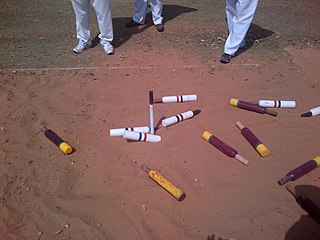
South Africa has some traditional games.
